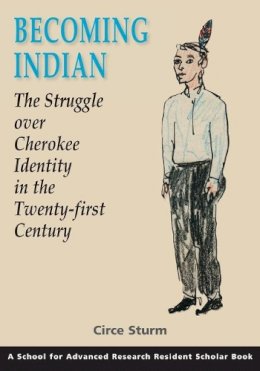
Stock image for illustration purposes only - book cover, edition or condition may vary.
Becoming Indian: the Struggle Over Cherokee Identity in the Twenty-first Century (Resident Scholar) (School for Advanced Research Resident Scholar)
Circe Sturm
€ 39.99
FREE Delivery in Ireland
Description for Becoming Indian: the Struggle Over Cherokee Identity in the Twenty-first Century (Resident Scholar) (School for Advanced Research Resident Scholar)
Paperback. Num Pages: 262 pages, maps. BIC Classification: 1KBBF; HBJK. Category: (G) General (US: Trade). Dimension: 436 x 436 x 629. Weight in Grams: 590.
In Becoming Indian, author Circe Sturm examines Cherokee identity politics and the phenomenon of racial shifting. Racial shifters, as described by Sturm, are people who have changed their racial self-identification from non-Indian to Indian on the US Census. Many racial shifters are people who, while looking for their roots, have recently discovered their Native American ancestry. Others have family stories of an Indian great-great-grandmother or grandfather they have not been able to document. Still others have long known they were of Native American descent, including their tribal affiliation, but only recently have become interested in reclaiming this aspect of their family history. Despite their differences, racial shifters share a conviction that they have Indian blood when asserting claims of indigeneity. Becoming Indian explores the social and cultural values that lie behind this phenomenon and delves into the motivations of these Americans—from so many different walks of life—to reinscribe their autobiographies and find deep personal and collective meaning in reclaiming their Indianness. Sturm points out that "becoming Indian" was not something people were quite as willing to do forty years ago—the willingness to do so now reveals much about the shifting politics of race and indigeneity in the United States.
Product Details
Format
Paperback
Publication date
2011
Publisher
SAR Press
Condition
New
Number of Pages
280
Place of Publication
Santa Fe, United States
ISBN
9781934691441
SKU
V9781934691441
Shipping Time
Usually ships in 7 to 11 working days
Ref
99-1
Reviews for Becoming Indian: the Struggle Over Cherokee Identity in the Twenty-first Century (Resident Scholar) (School for Advanced Research Resident Scholar)
Circe Sturm is among the most influential, innovative scholars of Native American experience today. Becoming Indian examines the phenomenon of race shifters sometimes derided as wannabes and fake Indians who have claimed Native identity by the many thousands in recent decades. It s a tricky, touchy topic, and yet one that Sturm handles with characteristic empathy and insight. Her book gives us a new understanding of the struggle over who will count as Native American and the tangled politics of heritage, blood, and belonging in twenty-first century America." —Orin Starn, author of Ishi s Brain: In Search of America s Last Wild Indian "Becoming Indian is an utterly absorbing study of Cherokee associational life in the age of multicultural America. With her engaging style and crystal clear understanding of complex race and social relations, Circe Sturm unveils the intricate motivations of individuals and groups with newly claimed Cherokee identities, as well as the reactions to their claims by members of the three federally recognized Cherokee nations. Sturm develops a novel vocabulary and fresh conceptualizations to describe these racial shifters and citizen Cherokees, revealing that while often at odds, they do share common epistemological ground." —Tiya A. Miles, University of Michigan "Sturm...explores the identity politics of becoming Indian. Sturm...offers thoughtful profiles of the various groups...who form quasi-tribes. Insightful and thought provoking, this volume is unique in its approach. Highly recommended." —C.R. Kasee, Choice, Nov. 2011, vol. 49, no. 03 "The book examines the shifting politics of race and Indian identity in the United States and reveals important insights concerning the link between competing claims to indigenous identity and tribal sovereignty." —Plains Anthropologist, vol. 57, no. 221, 2012
